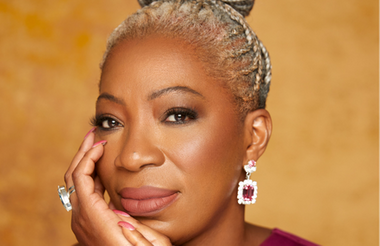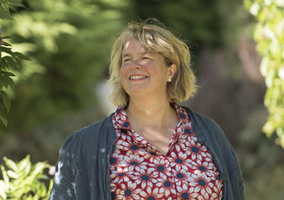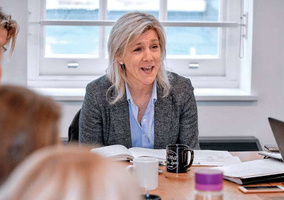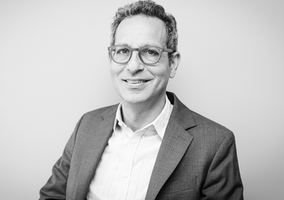Diana Award chief executive Tessy Ojo says leading a legacy charity like hers can be both “a blessing and a curse”.
Ojo has used her business acumen to enable the voluntary organisation to become financially independent from government and is enthusiastic about its plans to help “unlock the potential of young people”.
Nonetheless, she feels a “sense of catastrophe” regarding the charity sector, as the cost-of-living crisis has created “almost double” the need of the Covid-19 pandemic but with many donors unable to provide more money.
Taking a pay cut to join the charity sector
“My mum was a head teacher, so I’ve always been involved with children and young people in a voluntary capacity,” Ojo explains.
Though the chief executive initially studied chemistry, Ojo realised working as a biochemist in a lab she “didn't actually interact with people, and I was a very people person” so then went on to do an MBA and got into technology.
When Ojo joined the Diana Award, it was just being set up, and they were looking for someone to help build their systems.
“I thought I could bring my skills to a charity, but I wanted to do it on a voluntary basis, I didn’t really want to do it as a job. But I ended up taking the job, even though at the time it was crazy because it meant a £13,000 pay cut.
“I really wanted to give my time to the sector. I wanted to do something worthwhile, something that had always been my passion from a very young age. And I thought the more I stayed in the corporate world, the further I was away from my passion.”
‘Being a legacy charity is both a blessing and a curse’
As a charity legacy to Diana Spencer, Ojo says her organisation must align with the issues that the late Princess of Wales would be tackling if she were here today.
She notes people celebrate the work Princess Diana did around AIDS and HIV, in a time when myths around AIDS were very prominent, and people were stigmatised.
“If we put ourselves in the shoes of that time, it would have been very brave, very courageous. It would have been completely bucking the trend for her to have gone to do that.
“She went where the pain was irrespective of the cost of that pain, irrespective of how unpopular that cause was. We look at it through those lenses. She believed that young people with the right support can change the world. And for us, we think about what is a pain that young people are experiencing now and how can we go there even if it’s not popular, if it’s not a sexy thing to do? And that’s how we remain true to that legacy.”
“Being a legacy charity and having the name is a blessing and a curse. It’s a blessing because we’re part of a wider royal group, and that’s great to have. It’s a curse because everyone assumes that you have royal endowments, you have money, but actually we don’t – we have to fundraise like every other charity.”
‘Having a business mentality’
The Diana Award was set up with an endowment which came directly from the Treasury, but then the coalition government “took a different stance to philanthropy in the sense that they wanted every charity to be self-sustaining”.
Ojo feels her business background helped when the charity came to the end of its statutory funding, when it had to begin to fundraise.
“All of those skills came in really handy because it was about having a very clear plan about what’s our business plan, who should we be communicating to” so “being able to draw on all of those skills just made sense – having a business mentality, even though it was not for profit”.
‘Some people are constantly left behind’
The Diana Award strategy includes focusing on several thematic areas, including “unlocking the potential of young people”, understanding they’ve been held back because of the pandemic, “creating opportunities” and empowering young people to be involved in rebuilding society.
Ojo says “some people are constantly left behind” and the pandemic showed “there were structural inequalities in our system that set people back”.
For example, mental health was a huge problem for young people and the pandemic showed we often look at the issue through one lens.
“We were taught during the pandemic that it’s not enough to just provide more services, they needed to be culturally competent because mental health provision did not cater for a large proportion of young people’s needs. For example, what is a specialised service when it came to racial trauma?
“The UK is not a monolith. We’re not just one culture. Everyone needed something that could speak to their needs.”
‘Our system has been structured against minority groups – fact’
Ojo says the Covid-19 pandemic, murder of George Floyd and Black Lives Matter protests in 2020 spurred some changes in the sector as they showed the racism in its systems.
“Beneath the structural inequalities that we were looking at in the area of health, in the area of education, underpinning all of that was racism. Our system has been structured against minority groups – fact. I think that a lot of people came to that realisation.
“A lot of people, charities, corporates, came up with anti-racist statements and began to pay attention to what were the signs of systemic inequalities and racism in their own organisations.”
However, Ojo emphasises that “becoming anti-racist is a journey, it’s not a destination”.
“In the sector we’re here to do good, and there is kind of a halo effect that we have. A lot of people realised at the time that actually even within our systems, we’re not good. Within our systems, there were problems. And unpicking that was the first piece of work that everyone had to do.
“I know that people understood that systemic inequality was here, is here. People understood that in our organisations, a lot of our systems are built around that. People, I think, understood that there’s work to be done.”
But while Ojo says she saw “movement” to address inequalities, “where everybody is on that journey I genuinely do not know”.
‘I feel this sense of catastrophe’
“I am someone who tries to stay hopeful, because if you don’t have hope, then you have nothing to give. So, I constantly aim to give hope, and work in hope. I think if you work in the sector you have to believe that better days are coming.”
Nonetheless, Ojo says: “I have to say that I have a sense of doom, I have a sense that things are going to be catastrophic for young people.
“I say this because at the minute the big thing that we hear is this cost-of-living crisis. There’s poverty, there is hunger. We’re hearing the loud voices of adults who are telling us of the problems. What we’re not seeing or hearing are the children behind those families, for which we don’t know the impact. A lot of it will be hidden for a while.”
Ojo adds: “In the pandemic there was a lot of goodwill from trusts and foundations, from people wanting to give to charities to help tackle some of those needs.”
But “what we have now is almost double the problem that the pandemic had without the goodwill, not because people don’t want to give, but because people don’t have [money] to give”.
“I feel this sense of catastrophe. I hate to be that person that talks about problems, but I almost cannot hide the problems. I cannot wrap it up in hope because I think doing that almost takes away the gravity of the problem.”
‘Your cause is not the only issue you’re dealing with’
Ojo says: “Charities have expertise in dealing with humans, in looking at humans from that intersectional point of view”.
For example, when you’re tackling mental health, charities look at housing, education and other perspectives.
Civil society looks at “the root causes”, and therefore “charities have a huge role to play in redefining and reshaping some of society’s biggest issues”.
“When I hear people saying ‘stick to your cause’, I think you have no idea what you’re talking about, because your cause is not the only issue you’re dealing with. You’re tackling that cause but, you have to look at the root causes.
“There’s so many interdependencies and therefore, to shut down charity leaders from being involved in those big societal issues is short sighted.”
Ojo adds: “Charities have to absolutely be involved in those big conversations, because those are societal problems that we are dealing with.”
Sector organisations should not only be bought in the aftermath, as society “should get them on the table right now, whilst we’re redesigning what the solution looks like”.
“As we come into an election year, we want to make sure that policy people, decision-makers, understand very clearly those root causes. If we’re going to have systemic change in the area of mental health, we need to look at it wholly. If the triggers are still there, then nothing will change.
“We want young people to be hopeful – hope should never be a luxury item for young people. We want every young person to feel confident that their hopes are valid.”
Related Articles












